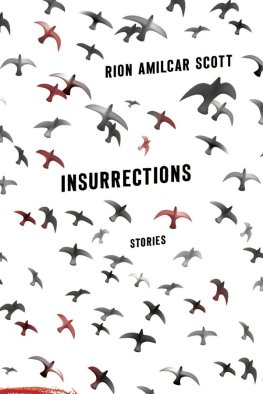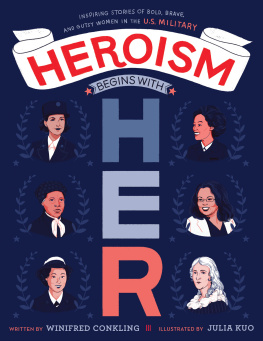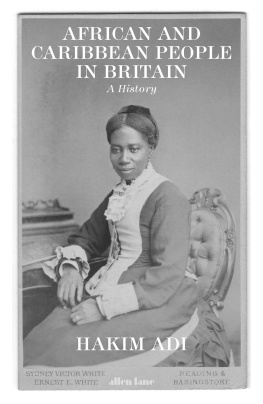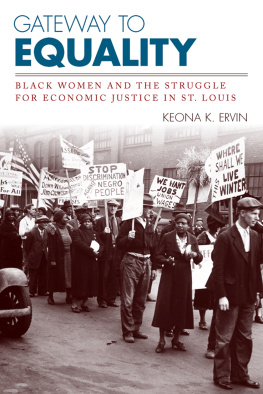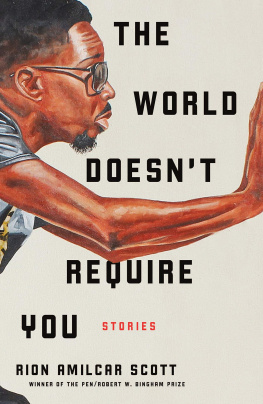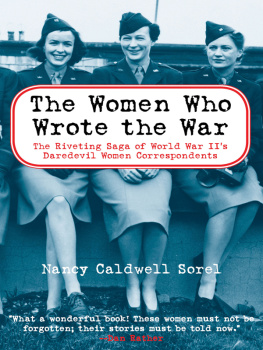And It Begins Like This
Executive Editor: Diane Goettel
Book and Cover Design: Amy Freels
Copyright LaTanya McQueen 2018
ISBN: 978-1-62557-703-0
All rights reserved. Except for brief quotations in critical articles or reviews, no part of this book may be reproduced in any manner without prior written permission from the publisher: editors@blacklawrencepress.com
Published 2018 by Black Lawrence Press.
Printed in the United States.
For those who have yet to be seen,
and for those who have yet to be heard.
In the Name of the Fathers
In Caswell County, North Carolina if one were to drive down U.S. Route 158, youd come to the intersection of U.S. Route 150. Turn right on 150, and a little ways on youll see a placard for Bedford Brown:
Bedford Brown, U.S. Senator, 182930, State Legislator,
Opponent of Secession, 1860.
This is Rose Hill. His Home.
The placard seems easy to miss if youre not looking for it. Its not often one pays attention to the signs of history, and in the summer when the wind sways it could be partially obscured by the trees. Past this placard and on down a road you can barely see youd eventually find Browns plantation home, known colloquially as the Bedford Brown House. In 1973 it was listed in the National Register of Historic Places, but it's a private residence now so there are no tours. Without context the house looks unremarkable. From photos, it is a two-story Colonial style house, the exterior painted white with dark green shutters. Thick rose bushes frame the front. If youre there in the summer, one can imagine the smell of wild roses filling the air.
Near this plantation, hidden among the looming cedar trees, is a small unpaved road, a path really, once known to my family as Siddle Road, and it is here at this crossing where the origins of my family history begins.
Lets start with what I know.
My grandfathers name was Marvin Siddle. He was the second youngest of twelve children. One of Marvins older brothers, William, bore the same name of his fatherWilliam Lovelace Siddle, listed also as Wells on the 1920 census. This is confusing until I remember how notoriously inaccurate census records were. Whats your husbands name? I imagine the census taker asking, his throat scratchy from thirst, as he stood on the front stoop of yet another farm. I cant hear you. Say it again? Well?
So Well L. Siddle, nicknamed sometimes Billie by his family, formally called William (named after his father), who is listed as mulatto on this census.
This is what I know.
I also know that there is an earlier 1880 census for a William Siddle, also married, but this onethis one listed as white.
We should have been Browns, my godmother tells me. She is also my mother's cousin. They grew up on neighboring farms and worked the tobacco fields together. Despite this parallel, once the evening came my godmother would venture home to schoolwork whereas my mother continued working the fields far late into the night. There's guilt in her voice when we talk of the past and I've often wondered how much of their upbringing factored into what their lives would become. It's a question I sense she's thought about as well but I dare not ever ask.
The census may say Siddle, she explains, but it should have been Brown, had the mother named the children after her slave name, but she didnt. They have the surname of another man, a white one.
The woman my godmother is talking about is Leanna Brown, my great-great-grandmother. Leanna Brown, nicknamed by her children as Granny Brown, once a slave of the Bedford Browns.
The folklore in my family has always been that Leanna had em up or took William Siddle, the father of her children, to court to make sure they carried his name. This would have been during the height of Reconstruction, before Jim Crow took its fierce hold of the South.
I never believed my father when he told me the story. I always thought he made it up, but Ive learned through research that during that time plenty of women did something similar. So while I didnt believe him before I believe him now, she said.
It took my mother's death to make me question the pieces of her life and the person I knew. I've begun to reexamine what could have been possible as explanation for the way she was.
Tell me though, how does one begin to find the truth in the past? Who do you turn to when most of the people who could have known are gone?
If a given name can be a marker of a cultural identity then my name is marked as black. I knew this as a child. I told myself what I hated was the pause of uncertainty on the first day of class when a teacher did roll. Laa they'd begin, the uncertainty in their voice. Just tell me what it is, finally saying as they sighed with resignation.
I hated also the misspellings that inevitably happened. The sheer unwillingness to learn, instead writing their own versions of a signifier of my identity.
These were the reasons I used as justification when I asked my mother if I could have my name changed. Deep down, my mother had always resented my name as well. Perhaps it was because my father might have mistakenly told her the story of why he picked it. (I knew a girl with that name and I thought she was the hottest thing I ever saw!) Or it could be because of the simple fact that my father gave it to me. At the time they were in the midst of a divorce and she could have used this as a tactic of revenge. I suspect though that her reasons were the same ones I'd finally admit to myself that I also had. She hated the names associationsthat I am black, that before anyone knew me they would know my name and what it signified.
My father, for obvious reasons, would not agree to the decision to change my name. Why don't you want your name? he would say over and over to a crying child on the phone. Why don't you want to be who you are?
What I am interested in now are the ways in which a series of circumstances and actions can contribute to the people we become.
Be glad you're not dark, I remember my mother telling me as a child. Be glad you have light skin and good hair that doesn't kink up too much. People will like you more. Not too much, because you're still black, but more.
I will think of my mother's words often throughout my life. They will help to explain the reasons for why as a child I will scrub my skin raw, ashamed even then of my blackness. I'll think of them when, like with my name, I'll seek to change other parts of myself. My hair will grow out long. Ill wear blue contact lenses. The combination of these making acquaintances and friends question. What are you? they'll ask, reaching out for the briefest of seconds to touch my hair.
And I'll lie when people ask me my race. Theyll always ask and Ill tell them I am mixed. I'll say whatever I think I can get away with. Which one of your parents is white? they'll always assume, and this will be where I always falter, wondering which one of my parents to erase.
My mother grew up on a farm in a place called Ruffin, North Carolina. Ruffin is less than thirteen miles away from the Locust Hill Township in Caswell County. Locust Hill, specifically an area called Rose Hill, is where the original Siddle farm was located.
The story here is that there were two plantations. The first belonging to the Bedford Browns and nearby, down a path, a smaller plantation of a white family named Siddles. A man named Will Siddle had a relationship with Leanna Brown, a slave or servant of the Bedford Browns.
Their relationship produced three children, one being my great-grandfather William, sometimes called Billie, Siddle. Some time when Billie is older he'll get enough money together to buy land and build that house in Ruffin. That house will be the one my grandfather will grow up in and eventually my mother will too.
Next page

